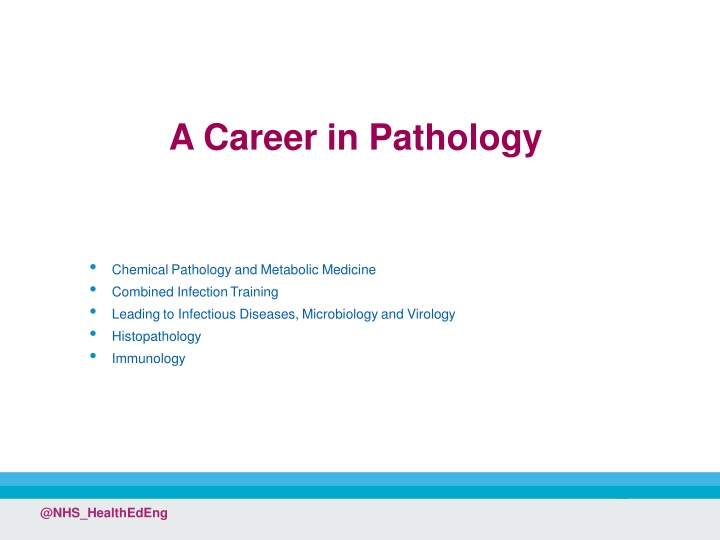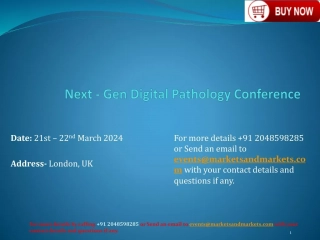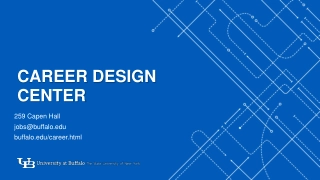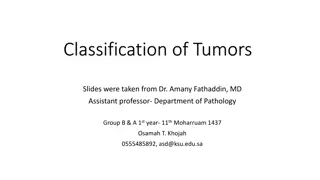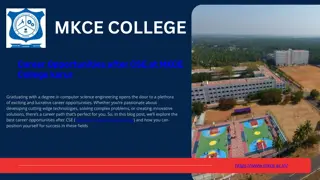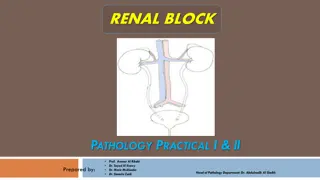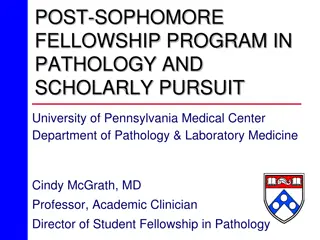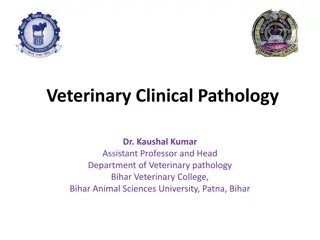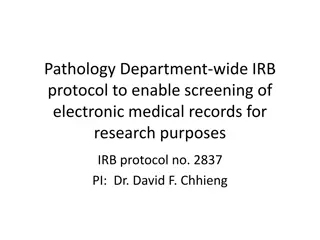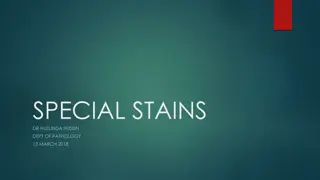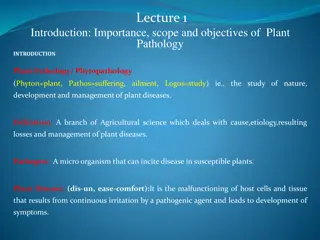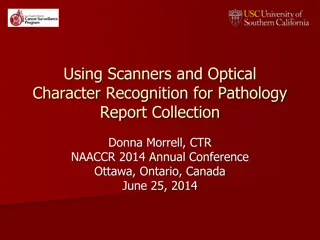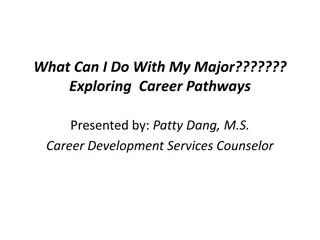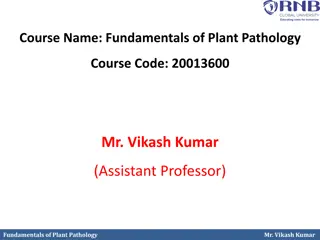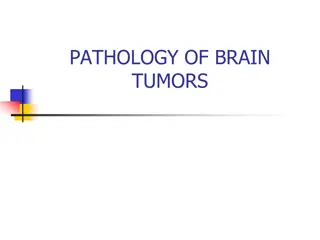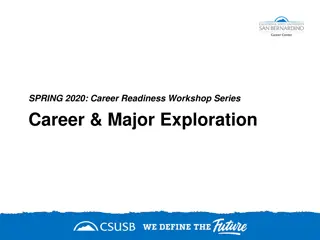A Career in Pathology
Pathology offers a diverse range of specialties including Chemical Pathology, Metabolic Medicine, Infection Training, Histopathology, Immunology, and more. Specialists in pathology play a vital role in diagnosing and managing patients, working collaboratively with other healthcare professionals. Explore entry routes to specialist training and generic aspects of disciplines within pathology.
Download Presentation

Please find below an Image/Link to download the presentation.
The content on the website is provided AS IS for your information and personal use only. It may not be sold, licensed, or shared on other websites without obtaining consent from the author.If you encounter any issues during the download, it is possible that the publisher has removed the file from their server.
You are allowed to download the files provided on this website for personal or commercial use, subject to the condition that they are used lawfully. All files are the property of their respective owners.
The content on the website is provided AS IS for your information and personal use only. It may not be sold, licensed, or shared on other websites without obtaining consent from the author.
E N D
Presentation Transcript
A Career in Pathology Chemical Pathology and Metabolic Medicine Combined InfectionTraining Leading to Infectious Diseases, Microbiology and Virology Histopathology Immunology @NHS_HealthEdEng
Contents Pathology Overview Chemical Pathology and Metabolic Medicine Combined Infection Training Histopathology Immunology Further Information (Please click on topic for direct link) @NHS_HealthEdEng
Why train in a Pathology Specialty? All disciplines support the diagnosis and management of patients across primary and secondary care, often in a multidisciplinary environment. This offers a broad exposure to clinical problems across a wide range of specialties. We are highly valued by our colleagues for our contribution. Mixture of laboratory and clinical work. Opportunities to develop special interests or remain generalist. Good work life balance and family friendly training opportunities. @NHS_HealthEdEng
Just to bust some myths We don t hide in the laboratory. We don t only cut up dead bodies . So We do play an important part in caring for patients, working alongside other clinicians. The more complex the patients the more we are needed and valued as part of the team. It s a great career if you are interested in diagnostic puzzles and interesting patients. @NHS_HealthEdEng
Entry routes to specialist training Core medical training and MRCP required for o Chem Path & Metabolic Medicine (orACCS-AM) o Combined Infection Training o Immunology o (Haematology also takesACCS-AM and Paeds) Foundation training required for o Histopathology For information see: The Royal College of Pathologists o Haematology is overseen by RCP Haematology @NHS_HealthEdEng
Generic aspects of disciplines: Laboratory Work Work alongside clinical scientists and healthcare scientists to provide a diagnostic service and offer: o Clinical interpretation of abnormal results and liaison with clinical teams o Advice to clinicians on appropriate investigations o Clinical leadership of laboratory and ensure laboratory repertoire supports clinical services o Support in development of new methods @NHS_HealthEdEng
Generic aspects of disciplines: Laboratory Work In order to do this you need: o Agood understanding of clinical practice o Credibility within the multidisciplinary team o Logical analytical skills o An ability to communicate complex technical information to non- experts, including clinicians and managers @NHS_HealthEdEng
Generic aspects of disciplines: Clinical Work Chemical Pathologists and Immunologists have an outpatient service and undertake clinics. Infection specialists may have their own clinics or attend as a part of an MDT clinic. Liaison with clinicians is through ward visits, including regular ICU rounds and by phone. Good communication via a range of means is essential to being an effective pathologist. @NHS_HealthEdEng
Generic aspects of disciplines: Clinical Work Clinical service is increasingly delivered in an MDT environment so you need to: o Build relationships with clinical teams o Be willing to be the sole representative of specialty within the wider MDT, but we always welcomed! @NHS_HealthEdEng
What is it like to train in pathology? You will undertake a mixture of laboratory and clinical training. You will see patients, but unlike many specialties we have much more flexibility and may choose who we see and how we deliver our clinical service. Most of the work in within office hours Monday to Friday. Less than full time training is well established so offers plenty of opportunity for those who require a family friendly working pattern, whilst engaging in a full training programme. @NHS_HealthEdEng
Personal Qualities Person Specification @NHS_HealthEdEng
What is it like to train in pathology? You will need to pass FRCPath, which may involve a practical exam as well as written (specialty dependent). Although many of us do not regularly undertake bench work as a Consultant, this experience means we have a good understanding of the diagnostics on which to base our interpretation of results and clinical practice. Length of training programmes vary, but are around 5 years. On call commitments vary, but are usually non-resident and for telephone advice, although we may attend the lab on weekend mornings. @NHS_HealthEdEng
Individual Specialties Chemical Pathology and Metabolic Medicine @NHS_HealthEdEng
Chemical Pathology and Metabolic Medicine Clinical scientists are well established in chemistry labs, meaning Chemical Pathologists can spend more time doing lipid, metabolic bone and endocrine clinics. Their clinical skills compliment those of their scientist colleagues in delivery of the lab service, where they jointly deliver the clinical liaison service. The scientists may be more involved in method development, but the chemical pathologist also develops these skills during training. Specialist areas include toxicology, endocrinology, lipid metabolism, in-born errors. @NHS_HealthEdEng
West Midlands There are 5 NTNs in the West Midlands and training placements are in large hospitals which provide the full range of experience required by the curriculum. The rotation is very flexible to suit the individual trainee s needs and interests. The population of the West Midlands offers particular exposure to inborn errors of metabolism, a particular strength of the programme . @NHS_HealthEdEng
Individual Specialties Combined Infection Training Leading to CCT in: o ID / GIM o ID / Microbiology o ID / Virology @NHS_HealthEdEng
Combined Infection Training CIT is a new programme created in recognition of the commonality between ID / Microbiology and Virology, taking 2 years. This augments the interpretation of results and lab aspects for ID Physicians and the clinical skills of Microbiologists and Virologists compared to the previous programmes. This is followed by a further 3 years of higher training with an award of dual CCT in ID/GIM, ID / Microbiology or ID / Virology. @NHS_HealthEdEng
Combined Infection Training Single CCT programmes are available elsewhere (2 years CIT and 2 years higher training). In future there may be a change to a single Infection CCT , so in the West Midlands we felt it important to future proof the careers of new trainees by having dual CCT programmes. The specialty embraces laboratory diagnostics using traditional culture, and increasingly molecular methods. Clinical work involves daily ward rounds on ICUs and other wards as well as MDTs. The ID placements offer inpatient care, clinics and variable amounts of GIM. @NHS_HealthEdEng
Combined Infection Training Infection control involves liaison with staff of all grades and disciplines including non clinical staff and gives a more global perspective of infection and the work of the Trust compared to managing individual patients. Antimicrobial stewardship is increasingly important, with opportunity to influence practice through policy development @NHS_HealthEdEng
Higher Specialist Training This is 3 years involving further experience in 2 specialties, and is a mixture of clinical and lab work in greater depth than the CIT programme, leading to dual CCT. Out of Programme Research is encouraged as traditionally ID posts have been highly competitive. @NHS_HealthEdEng
West Midlands There are 22 NTNs, including ACFs, training across the region in 8 Trusts. This offers a full range of general and tertiary services including transplant services. The range of experience during training is arguably the widest in the UK. The rotation of placements is tailored to the individual trainees interests, and with a relatively small number of trainees we can offer a more bespoke approach to training. @NHS_HealthEdEng
Individual Specialties Histopathology @NHS_HealthEdEng
Histopathology Histopathologists make the diagnosis on initial biopsies and are involved in the final staging of cancer resection specimens. They actively participate in MDT and are an integral part of cancer pathways Whilst post mortem examination has declined, it is still required in the early phase of training, and may be continued in later training. Histopathologists are increasingly sub-specialising (e.g. breast, skin etc.) or paediatric/perinatal. CCT in forensic pathology is available, with services provided by the Home Office rather than the NHS. @NHS_HealthEdEng
Training The regional rotation is split geographically and will offer the full range of experience to gain CCT. To see how this is organised see: Health Education England, East Midlands, West Midlands or East of England o Rotations o Training and the role of Histopathologists @NHS_HealthEdEng
Individual Specialties Immunology @NHS_HealthEdEng
Immunology Immunologists investigate and care for patients with immunodeficiencies, allergies, systemic vasculitis both leading care or jointly with haematologists, rheumatologists, nephrologists etc. They are often very complex patients who require a multidisciplinary approach. @NHS_HealthEdEng
West Midlands Most of the training in based in Birmingham Heartlands Hospital, with opportunities for academic and clinical work with the University of Birmingham Department. The diverse range of population and specialist services within Birmingham and the West Midlands offers excellent experience in all aspects of clinical immunology @NHS_HealthEdEng
Where to go for more information If this has wetted your appetite please contact us for a discussion and more information. East Midlands Chemical Pathology and Metabolic Medicine o STC Chair o Trainee Representative Combined InfectionTraining o STC Chair o Trainee Representative Histopathology o STC Chair o Trainee Representative Immunology o STC Chair o Trainee Representative Head of School of Pathology - @NHS_HealthEdEng
Where to go for more information If this has wetted your appetite please contact us for a discussion and more information. West Midlands Chemical Pathology and Metabolic Medicine o STC Chair Dr Charlotte Dawson o Trainee Representative vacant Combined InfectionTraining o STC Chair Dr Savita Gossain & Dr Jenny Short o Trainee Representative Dr Mike Riste & DrAmy Chue Histopathology o STC Chair Dr Rahul Hejmadi & DrAnjali Bhatnagar o Trainee Representative Dr Matthew Evans Immunology o STC Chair Dr Thirumala Krishna o Trainee Representative Dr RichardAntrobus Head of School of Pathology - Dr Debbie Mortiboy @NHS_HealthEdEng
Where to go for more information Health Education England, East Midlands Pathology NHS Health Careers Royal College of Pathologists The Pathological Society @NHS_HealthEdEng
